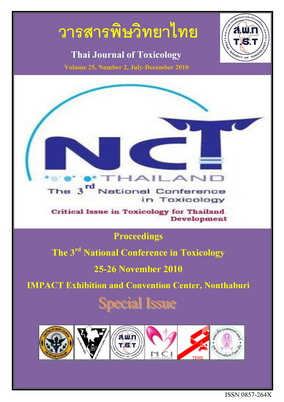Expression and Possible Role of CD44 in Cholangiocarcinoma Cell Line.
Main Article Content
Abstract
Cholangiocarcinoma is a cancer of the bile duct and is a major health problem in the north-eastern part of Thailand. CD44 is a family of cell surface adhesion molecule, consisting of numerous members generated by alternative splicing of a single gene. Expression of CD44 variant isoforms has been implicated in tumorigenesis as well as in the invasiveness and metastatic potentials of many tumor types. Although CD44 has been shown to bind to many li gands, the major one is hyaluronic acids (HA), a sugar which is a component of the extracellular matrix (ECM). In this project, we investigated if CD44 plays a role in regulating the metastatic property of cholangiocarcinoma, using a cell line, KKU-M213, as a model. We showed that CD44 was expressed in KKU-M213 using RT-PCR and immunofluorescence microscopy. Furthermore, we demontstrated that the invasiveness of KKU-M213 was dependent on HA concentrations, suggesting that this process was mediated by CD44.
Using RT-PCR and primers specific to standard exons 5 and 16, which are present in all CD44 transcripts, two weak bands of 569 bp and 965 bp were detected, whereas immunofluorescence staining of live cells with CD44-FITC polyclonal antibodies specific to all CD44 forms showed weak expression at the cell membrane of KKU-M213. In vitro invasion assay revealed that increasing concentrations of HA (50-200 μg/ml) significantly enhanced invasion of KKU-M213 cells through artificial extracellular matrix (Matrigel), where 50 μg/ml HA augmented the invasiveness of KKU-M213 cells by 70 percent compared to control (no HA). However, the invasiveness dropped at higher concentrations HA (100 μg/ml and 200 μg/ml, respectively).
These data indicated that the KKU-M213 cells expressed CD44 which are likely to be responsible for the HA-dependent activation of the cancer cell invasiveness.


